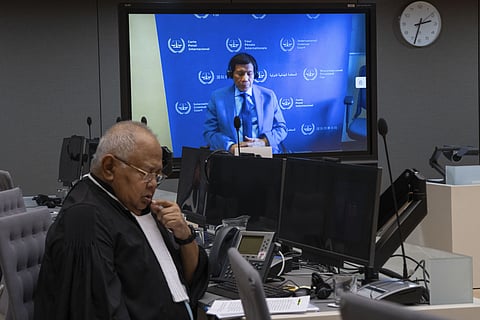
- NEWS
- the EDIT
- COMMENTARY
- BUSINESS
- LIFE
- SHOW
- ACTION
- GLOBAL GOALS
- SNAPS
- DYARYO TIRADA
- MORE

The legal team of former President Rodrigo Duterte has formally challenged the jurisdiction of the International Criminal Court (ICC) over the case against him, marking its first move to stop the proceedings.
Led by international lawyers Nicholas Kaufman and Dov Jacobs, Duterte’s defense team submitted a filing titled “Defense Challenge with Respect to Jurisdiction” to the ICC’s Pre-Trial Chamber I on 1 May.
“Pursuant to Article 19(2)(a) of the Rome Statute, the Defence for Mr. Rodrigo Roa Duterte hereby respectfully submits a challenge to the exercise of jurisdiction by the International Criminal Court,” the document stated.
“For the sake of judicial efficiency, the defence submits that this challenge should be resolved as a preliminary matter. Such an approach will prevent the unnecessary expenditure of resources incurred by allowing a confirmation of charges hearing to proceed in the absence of any jurisdictional basis,” it added.
The lawyers argued that the ICC no longer had authority over the Philippines following the country’s withdrawal from the Rome Statute in 2018.
“When the former prosecutor filed her request, and the Pre-Trial Chamber issued its decision more than two years later, the preconditions to the exercise of jurisdiction could no longer be, nor were they, fulfilled,” the defense stated.
The Philippines withdrew from the Rome Statute in March 2018 upon Duterte’s directive. The withdrawal took effect in March 2019.
The defense also accused the prosecution of failing to justify why the court should not adhere to the “plain language of the Rome Statute.”
“The prosecution has, furthermore, systematically confused jurisdiction and the preconditions to the exercise of jurisdiction,” the defense team said.
It also argued that Article 127(2) of the Rome Statute, which allows the ICC to continue cases initiated before a country’s withdrawal, did not apply in Duterte’s situation.
Kaufman had previously expressed confidence that Duterte would be acquitted at the earliest stage of the proceedings.
“I’m very confident in the strongest defense possible, and I’m very confident that he will be acquitted, indeed, even at the earliest stage possible,” Kaufman told reporters following a brief visit with Duterte in March.
Kaufman, who has handled high profile ICC cases, also pointed to Duterte’s arrest in the Philippines as a key defense issue.
“He was completely denied all his rights in the Philippines. That will obviously be an argument in the course of this defense,” he said.
Duterte was arrested on 11 March at Ninoy Aquino International Airport upon his return from Hong Kong. He was flown the same day to The Hague, Netherlands, where the ICC is based.
The former president is accused of murder, qualified as a crime against humanity, allegedly committed between 1 November 2011 and 16 March 2019.
Government data estimated at least 7,000 people were killed in the drug war during Duterte’s term. However, local and international human rights groups claimed the death toll could be as high as 30,000.
Meanwhile, Malacañang said Duterte’s legal team should be allowed to mount his defense as part of due process.
“If their defense is that the ICC has no jurisdiction over the matter, then that’s part of due process. Let them be. And what the ICC will do is in the hands of the ICC,” said Palace Press Officer Undersecretary Claire Castro during a briefing on Friday.
Castro also denied reports President Ferdinand Marcos Jr. had said in a letter his administration would not cooperate with the ICC.
“I have no information at the moment regarding that letter. Did the letter supposedly say the Marcos administration will not interfere in the ICC’s actions? Even without such a letter, we have no intention of interfering with whatever mandate the ICC has,” she said.
